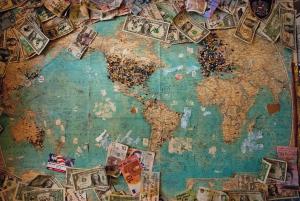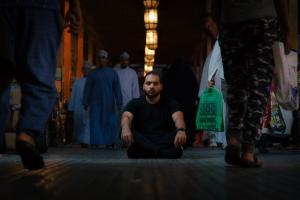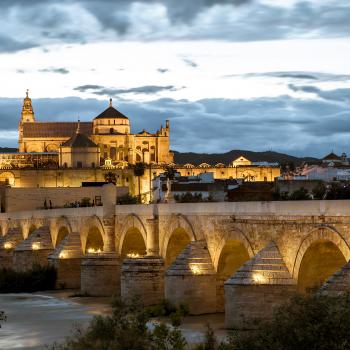
Anyone who comes from the resource-dense third world intuitively understands that the problem of poverty is not material but political. It has never been about a lack of resources, but about the individual freedom to develop technology to convert resources to material wealth. You may not see anyone starting revolutions with slogans that read “We Want Capitalism!” or “We want the state to stay out!” And yet the Arab Spring was triggered by the cries of a man who was prevented, not from praying, not from protesting, but from selling his fruit; The fruit of his labor.

To be fair, the modern-day distaste for capitalism in the Muslim world while misguided is not totally unwarranted. For one, the Muslim world is only familiar with a kind of crony capitalism where the privatization of resources is exclusively granted to so-called “entrepreneurs” who are “well connected,” either by blood or because they have shed blood on behalf of the dictators that oppress them.
If an average citizen wishes to open a business in a country like Egypt for example, he will need a license which he can only obtain by belonging to or being close to a member of the ruling elite. And even if one is able to obtain a license they would have to bribe or “share their profits” with crooked officials euphemistically referred to as bureaucrats.
Furthermore, Corporations have a long history of employing the U.S government, using American tax dollars, to forge alliances with mafias in the Muslim world, who are euphemistically referred to as autocrats; All in the name of capitalism.
 But capitalism is not just an economic model but a social one where certain values like individual rights, freedom of speech, rule of law, objectivity, and most importantly, property rights have to exist.
But capitalism is not just an economic model but a social one where certain values like individual rights, freedom of speech, rule of law, objectivity, and most importantly, property rights have to exist.
Without the mechanisms of enforceable legal representation, you get the brand of capitalism that we have today. The brand where men employ the government to act as a weight upon which they can leverage productivity and ensure limited liability. In other words, you get Donald Trump’s capitalism. Capitalism designed to give privileges to some not based on a system of meritocracy but plutocracy. A system that makes concessions for some and not others, opening the door to the political corruption inherent in today’s pressure group politics.

Is Islam pro-capitalism
The fact that many Muslims today oppose capitalism does not mean Islam is opposed to it. Islam is an ideology that stands apart from its adherents in the same way that capitalism is a social system that stands apart from those who commit crimes in its name.
Islam is a pro-market religion with a pro-capitalism ideology. The principles and spirit of capitalism took root in Islamic civilization long before the seeds were even planted in Europe. Long before there was Adam Smith there was the father of modern economics, Ibn Khaldun. And long before there was John Locke there was Ibn Tufyl, who is said to have heralded in the scientific revolution.
The prophet Muhammed’s Position on the free market can be encapsulated in the following tradition or hadith:
When the city of Medina encountered problems resulting in a shortage of food, not healthcare, but food, not internet access, but food, there were attempts by his companions imploring him to fix prices. The prophet’s response was this “God grants plenty or shortage; He is the sustainer and real price Maker. I wish to go to him having done no injustice to anyone in blood or in property.”
In other words, economics must exist as an extension of natural law and fluctuate as naturally or catastrophically as the weather. Nature can be harsh but it is also restrained by the immutable laws of cause and effect.
In Islam, the law or Sharia is the codification of natural law within a particular social context. Natural law is an extension of God’s law and a free market responds to mankind in the same way that nature does. To be commanded it must be obeyed.
The Quran’s position is equally clear in its endorsements. Success is defined as a goal both in this life and the next. The Quran emphasizes the contractual nature of human interaction with an emphasis on mutual agreement. And it holds property rights as a sacred trust which must never be violated by the state or other individuals. Nor does it condone government ownership of property. The prophet emphasized the importance of property rights in his farewell pilgrimage by declaring to his followers that “Nothing shall be legitimate to a Muslim which belongs to a fellow Muslim unless it was given freely and willingly.”
“O’ you who believe. Squander not your wealth among yourselves in vanity, except it be a trade by mutual consent.”
“And in no wise covet those things in which God hath bestowed his gifts more freely on some of you than on others; to men is allotted what they earn and to women what they earn.”
Islamic civilization’s economic infrastructure was not built by the state, but by civil institutions like charitable endowments (awqaf). Property rights were expanded to include women. And an objective standard of weights and measures, as well as commercial law, were a few of the many features which pushed Islamic civilization to the economic front lines. Islam is a religion that not only took the sacred and applied it to the secular world but took the secular (man’s life and his property) and declared them sacred.
So, if Islam was so philosophically advanced and consistent with free-market principles, why did the Muslim world decline so rapidly?
When Muslim governments suppressed the scholarly tradition of Ijtihad or independent critical thinking, they petrified the process of Islamic jurisprudence and replaced it with a process of blind imitation called Taqlid. Hundreds of years’ worth of intellectual stagnation led to a brand of scholarship where government and religion began to foster an unhealthy alliance. Unlike scholars of early Islamic civilization, who were completely independent of the government, the present-day scholars cannot boast any degree of intellectual freedom, which is why modern-day Muslims like me no longer recognize their authority. Even many independent mosques in many western countries hire Imams or scholars who are beholden to board members and exist simply to reinforce and lend credibility to the subjective decision-making process of a largely patriarchal and power-wielding establishment.
Compare this to the founders of all four Sunni schools of thought in Islam who endured persecution for refusing to collaborate with government entities. Abu Hanifa was imprisoned for refusing to accept a judgeship. And Ibn Hanbal was tortured for refusing to endorse a state-sanctioned doctrine.
The decline of a civilization is the decline of critical thinking, which is almost always a feature of an unhealthy mixture, not just between religion and politics, but of economics and politics too. Early Islamic civilization took their inspiration and guidance from a religious establishment that was divorced from government entities.
Islamic jurisprudence does not condemn wealth because it does not see wealth as something that exists independently of the values that make wealth possible. Values which are espoused by both capitalism and Islam.











